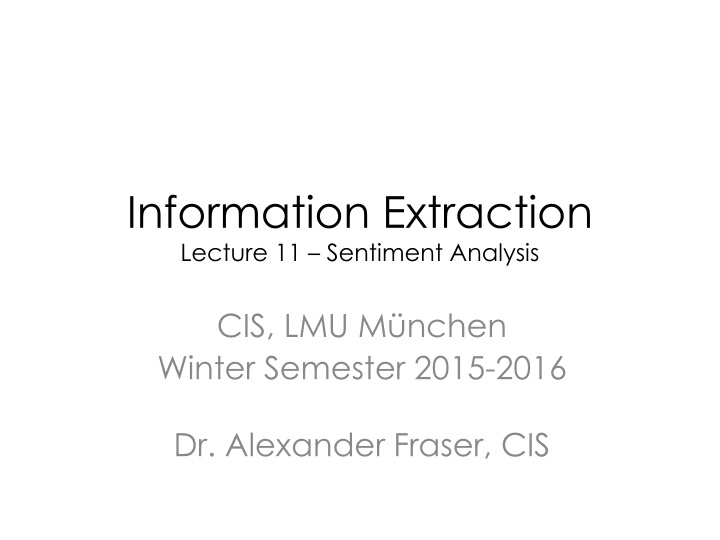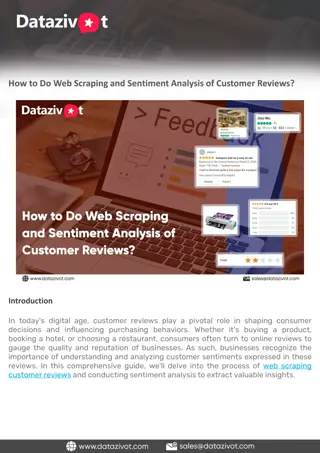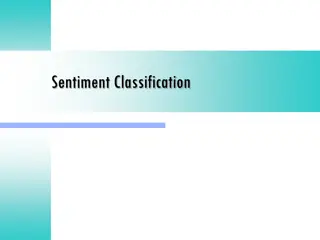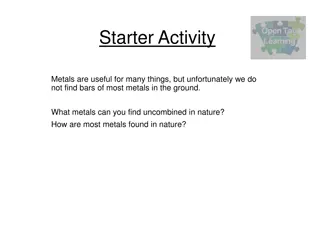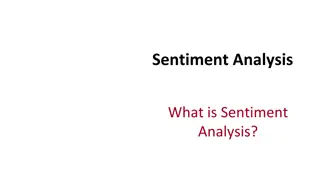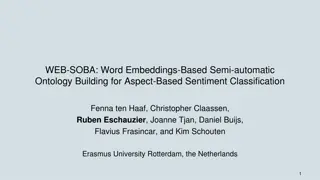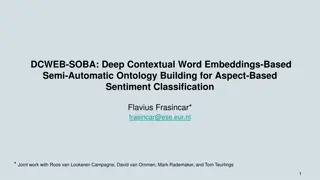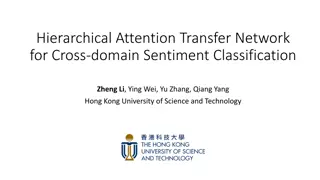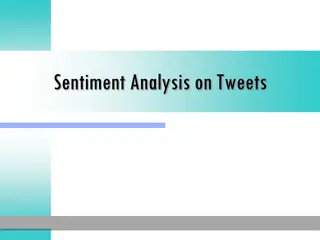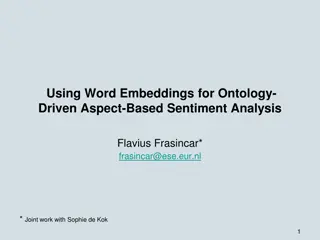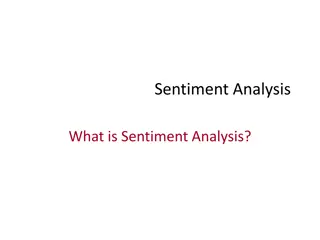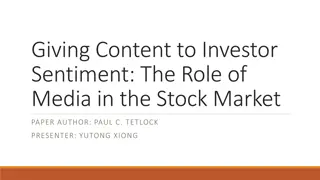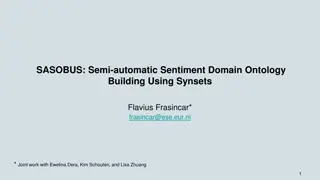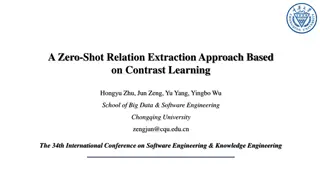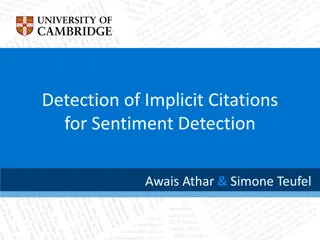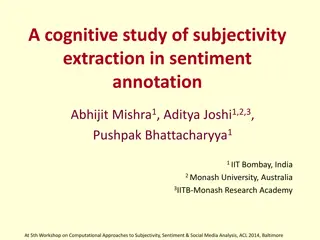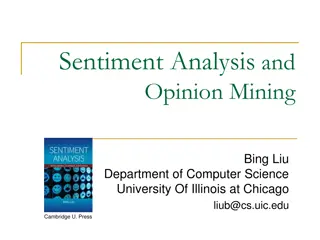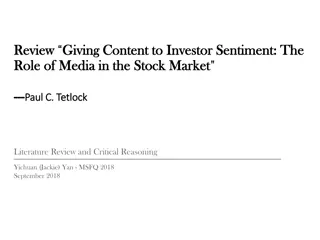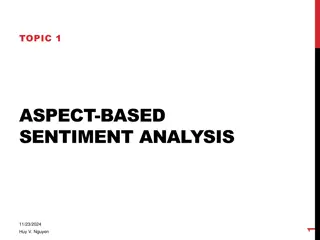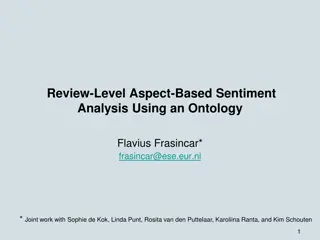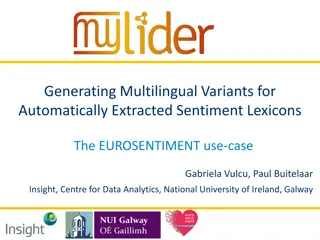Sentiment Analysis Lecture: Information Extraction & Applications
In this lecture, Dr. Alexander Fraser covers Sentiment Analysis within the realm of Information Extraction, exploring topics such as determining sentiments, review classification, sentiment tracking, and prediction applications.
Download Presentation

Please find below an Image/Link to download the presentation.
The content on the website is provided AS IS for your information and personal use only. It may not be sold, licensed, or shared on other websites without obtaining consent from the author.If you encounter any issues during the download, it is possible that the publisher has removed the file from their server.
You are allowed to download the files provided on this website for personal or commercial use, subject to the condition that they are used lawfully. All files are the property of their respective owners.
The content on the website is provided AS IS for your information and personal use only. It may not be sold, licensed, or shared on other websites without obtaining consent from the author.
E N D
Presentation Transcript
Information Extraction Lecture 11 Sentiment Analysis CIS, LMU M nchen Winter Semester 2015-2016 Dr. Alexander Fraser, CIS
Administravia I Four admin topics today 1) Web page now up-to-date, please check your row in the table! Many people have not sent me slides, please do this ASAP! 2) Three weeks means three weeks in which we have any class (i.e., the next two weeks do not count towards your three weeks) 3) Pr fungstermin (next slide) 4) Pr fungsanmeldung (following slide) 2
Administravia II Klausur ist am 27.01 (Mittwoch), hier, jetzt (16:00 c.t.) Papier mitbringen 3
Administravia III Pr fungsanmeldung IE has two Pr fungen Klausur (Vorlesung) Referat/Hausarbeit Note (Seminar) Please make sure you are registered for the Pr fung(en) you want! Make sure you are *not* registered for the Pr fung (if any) you do *not* want! The Pr fungsamt will refuse to make changes if you do not do the registration in LSF, so, DO THIS! 4
Addition from last time I was referring to the Open IE group associated with Gerhard Weikum at Max-Planck-Institut f r Informatik (Saarbr cken) last time, I forgot to say his name. 5
Sentiment Analysis Determine if a sentence/document expresses positive/negative/neutral sentiment towards some object Slide from Koppel/Wilson
Some Applications Review classification:Is a review positive or negative toward the movie? Product review mining:What features of the ThinkPad T43 do customers like/dislike? Tracking sentiments toward topics over time: Is anger ratcheting up or cooling down? Prediction (election outcomes, market trends): Will Romney or Obama win? Etcetera Slide from Koppel/Wilson
Level of Analysis We can inquire about sentiment at various linguistic levels: Words objective, positive, negative, neutral Clauses going out of my mind Sentences possibly multiple sentiments Documents Slide from Koppel/Wilson
Words Adjectives objective: red, metallic positive: honest important mature large patient negative: harmful hypocritical inefficient subjective (but not positive or negative): curious, peculiar, odd, likely, probable Slide from Koppel/Wilson
Words Verbs positive:praise, love negative: blame, criticize subjective: predict Nouns positive: pleasure, enjoyment negative: pain, criticism subjective: prediction, feeling Slide from Koppel/Wilson
Clauses Might flip word sentiment not good at all not all good Might express sentiment not in any word convinced my watch had stopped got up and walked out Slide from Koppel/Wilson
Sentences/Documents Might express multiple sentiments The acting was great but the story was a bore Problem even more severe at document level Slide from Koppel/Wilson
Two Approaches to Classifying Documents Bottom-Up Assign sentiment to words Derive clause sentiment from word sentiment Derive document sentiment from clause sentiment Top-Down Get labeled documents Use text categorization methods to learn models Derive word/clause sentiment from models Slide modified from Koppel/Wilson
Some Special Issues Whose opinion? (Writer) (writer, Xirao-Nima, US) (writer, Xirao-Nima) The US fears a spill-over , said Xirao-Nima, a professor of foreign affairs at the Central University for Nationalities. Slide from Koppel/Wilson
Some Special Issues Whose opinion? Opinion about what? Slide from Koppel/Wilson
Laptop Review I should say that I am a normal user and this laptop satisfied all my expectations, the screen size is perfect, its very light, powerful, bright, lighter, elegant, delicate... But the only think that I regret is the Battery life, barely 2 hours... some times less... it is too short... this laptop for a flight trip is not good companion... Even the short battery life I can say that I am very happy with my Laptop VAIO and I consider that I did the best decision. I am sure that I did the best decision buying the SONY VAIO Slide from Koppel/Wilson
Word Sentiment Let s try something simple Choose a few seeds with known sentiment Mark synonyms of good seeds: good Mark synonyms of bad seeds: bad Iterate Slide from Koppel/Wilson
Word Sentiment Let s try something simple Choose a few seeds with known sentiment Mark synonyms of good seeds: good Mark synonyms of bad seeds: bad Iterate Not quite. exceptional -> unusual -> weird Slide from Koppel/Wilson
Better Idea Hatzivassiloglou & McKeown 1997 1. Build training set: label all adj. with frequency > 20; test agreement with human annotators 2. Extract all conjoined adjectives nice and comfortable nice and scenic Slide from Koppel/Wilson
Hatzivassiloglou & McKeown 1997 3. A supervised learning algorithm builds a graph of adjectives linked by the same or different semantic orientation scenic nice terrible painful handsome fun expensive comfortable Slide from Koppel/Wilson
Hatzivassiloglou & McKeown 1997 4. A clustering algorithm partitions the adjectives into two subsets + slow scenic nice terrible handsome painful fun expensive comfortable Slide from Koppel/Wilson
Even Better Idea Turney 2001 Pointwise Mutual Information (Church and Hanks, 1989): ( ) ( word ) p word word = PMI ( , ) log word word 1 2 1 2 2 ( ) ( ) p p word 1 2 Slide from Koppel/Wilson
Even Better Idea Turney 2001 Pointwise Mutual Information (Church and Hanks, 1989): ( ) ( word ) p word word = PMI ( , ) log word word 1 2 1 2 2 ( ) ( ) p p word 1 2 Semantic Orientation: ) ( SO phrase = PMI ( " , excellent" ) PMI ( " , poor" ) phrase phrase Slide from Koppel/Wilson
Even Better Idea Turney 2001 Pointwise Mutual Information (Church and Hanks, 1989): ( ) ( word ) p word word = PMI ( , ) log word word 1 2 1 2 2 ( ) ( ) p p word 1 2 Semantic Orientation: ) ( SO phrase = PMI ( " , excellent" ) PMI ( " , poor" ) phrase phrase PMI-IR estimates PMI by issuing queries to a search engine hits( NEAR " excellent" )hits(" poor" ) phrase = SO ( ) log phrase 2 hits( NEAR " poor" )hits(" excellent" ) phrase Slide from Koppel/Wilson
Resources These -- and related -- methods have been used to generate sentiment dictionaries Sentinet General Enquirer Slide from Koppel/Wilson
Bottom-Up: Words to Clauses Assume we know the polarity of a word Does its context flip its polarity? Slide from Koppel/Wilson
Prior Polarity versus Contextual Polarity Wilson et al 2005 Prior polarity: out of context, positive or negative beautiful positive horrid negative A word may appear in a phrase that expresses a different polarity in context Cheers to Timothy Whitfield for the wonderfully horrid visuals. Contextual polarity Slide from Koppel/Wilson
Example Philip Clap, President of the National Environment Trust, sums up well the general thrust of the reaction of environmental movements: there is no reason at all to believe that the polluters are suddenly going to become reasonable. Slide from Koppel/Wilson
Example Philip Clap, President of the National Environment Trust, sums up well the general thrust of the reaction of environmental movements: there is no reason at all to believe that the polluters are suddenly going to become reasonable. Slide from Koppel/Wilson
Example Philip Clap, President of the National Environment Trust, sums up well the general thrust of the reaction of environmental movements: there is no reason at all to believe that the polluters are suddenly going to become reasonable. Contextual polarity prior polarity Slide from Koppel/Wilson
Lexicon Step 1 Step 2 All Polar Instances Neutral or Polar? Contextual Polarity? Instances Corpus Word token Word prior polarity Negated Negated subject Modifies polarity Modified by polarity Conjunction polarity General polarity shifter Negative polarity shifter Positive polarity shifter Slide from Koppel/Wilson
Lexicon Step 1 Step 2 All Polar Instances Neutral or Polar? Contextual Polarity? Instances Corpus Word token Word prior polarity Negated Negated subject Modifies polarity Modified by polarity Conjunction polarity General polarity shifter Negative polarity shifter Positive polarity shifter Word token terrifies Word prior polarity negative Slide from Koppel/Wilson
Lexicon Step 1 Step 2 All Polar Instances Neutral or Polar? Contextual Polarity? Instances Corpus Word token Word prior polarity Negated Negated subject Modifies polarity Modified by polarity Conjunction polarity General polarity shifter Negative polarity shifter Positive polarity shifter Binary features: Negated For example: not good does not look very good not onlygood but amazing Negated subject Nopolitically prudent Israeli could support either of them. Slide from Koppel/Wilson
Lexicon Step 1 Step 2 All Polar Instances Neutral or Polar? Contextual Polarity? Instances Corpus Modifies polarity Word token Word prior polarity Negated Negated subject Modifies polarity Modified by polarity Conjunction polarity General polarity shifter Negative polarity shifter Positive polarity shifter 5 values: positive, negative, neutral, both, not mod substantial: negative Modified by polarity 5 values: positive, negative, neutral, both, not mod challenge: positive substantial (pos)challenge (neg) Slide from Koppel/Wilson
Lexicon Step 1 Step 2 All Polar Instances Neutral or Polar? Contextual Polarity? Instances Corpus Word token Word prior polarity Negated Negated subject Modifies polarity Modified by polarity Conjunction polarity General polarity shifter Negative polarity shifter Positive polarity shifter Conjunction polarity 5 values: positive, negative, neutral, both, not mod good: negative good (pos) and evil (neg) Slide from Koppel/Wilson
Lexicon Step 1 Step 2 All Polar Instances Neutral or Polar? Contextual Polarity? Instances Corpus General polarity shifter Word token Word prior polarity Negated Negated subject Modifies polarity Modified by polarity Conjunction polarity General polarity shifter Negative polarity shifter Positive polarity shifter pose little threat contains little truth Negative polarity shifter lack of understanding Positive polarity shifter abate the damage
Lexicon Step 1 Step 2 All Polar Instances Neutral or Polar? Contextual Polarity? Instances Corpus Results 2a 90 80 77,2 70 65,7 65,1 Word token Word + Prior Polarity All Features 60 50 46,2 40 30 Accuracy Pos F Neg F Neutral F Slide from Koppel/Wilson
Lexicon Step 1 Step 2 All Polar Instances Neutral or Polar? Contextual Polarity? Instances Corpus Results 2b 90 80 70 Word token Word + Prior Polarity All Features 60 50 40 Pos Recall Pos Prec Neg Recall Neg Prec Slide from Koppel/Wilson
Top-Down Sentiment Analysis So far we ve seen attempts to determine document sentiment from word/clause sentiment Now we ll look at the old-fashioned supervised method: get labeled documents and learn models Slide from Koppel/Pang/Gamon
Finding Labeled Data Online reviews accompanied by star ratings provide a ready source of labeled data movie reviews book reviews product reviews Slide from Koppel/Pang/Gamon
Movie Reviews (Pang, Lee and V. 2002) Source: Internet Movie Database (IMDb) 4 or 5 stars = positive; 1 or 2 stars = negative 700 negative reviews 700 positive reviews Slide from Koppel/Pang/Gamon
Evaluation Initial feature set: 16,165 unigrams appearing at least 4 times in the 1400- document corpus 16,165 most often occurring bigrams in the same data Negated unigrams (when "not" appears to the left of a word) Test method: 3-fold cross-validation (so about 933 training examples) Slide from Koppel/Pang/Gamon
Results Slide from Koppel/Pang/Gamon
Observations In most cases, SVM slightly better than NB Binary features good enough Drastic feature filtering doesn t hurt much Bigrams don t help (others have found them useful) POS tagging doesn t help Benchmark for future work: 80%+ Slide from Koppel/Pang/Gamon
Looking at Useful Features Many top features are unsurprising (e.g. boring) Some are very unexpected tv is a negative word flaws is a positive word That s why bottom-up methods are fighting an uphill battle Slide from Koppel/Pang/Gamon
Other Genres The same method has been used in a variety of genres Results are better than using bottom-up methods Using a model learned on one genre for another genre does not work well
Cheating (Ignoring Neutrals) One nasty trick that researchers use is to ignore neutral data (e.g. movies with three stars) Models learned this way won t work in the real world where many documents are neutral The optimistic view is that neutral documents will lie near the negative/positive boundary in a learned model. Slide modified from Koppel/Pang/Gamon
A Perfect World Slide from Koppel/Pang/Gamon
The Real World Slide from Koppel/Pang/Gamon
